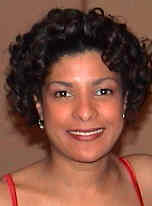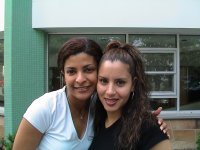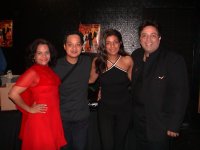|
Cyber-Interview of
the Month: Deanne Chandler
-by Manny
Siverio
Originally published on SalsaNewYork on 11/01
 This Month we interview
UK Mambo Instructor Deanne Chandler. This Month we interview
UK Mambo Instructor Deanne Chandler.
Deanne has traveled to NY on various occasions to learn the NY style of
Dancing Mambo. She, along with her partner Sai
Lee are currently listed in SalsaNewYork's
Out-of-town directory on Mambo Instructors. This year she and Sai
performed at East Coast Congress up in the Catskills, New York. The two are
currently teaching a Mambo class in London and have recently opened their SalsaConnexion
website. Deanne is a lovely soft spoken mambera who has a passion for dancing.
This will be her
second exposure in SalsaNewYork (his
instructor listing was the first). As usual it was a pleasure dealing
with her.
SNY: What's the Salsa scene like where you live? Is On2 poplar by you? If not,
what made you decide to teach it there?
DC: London in general has a very strong well developed Salsa scene, a lot of
> people have been learning on2 but not really dancing it as much in the general main stream clubs, however that is slowly changing as people
become more confident and aware of it. In particular if some see others
dancing
it, they begin to appreciate it more and want to learn and try it out.
I
think this is because London Salseros have largely danced on the 1 and 3,
initially influenced by the Cuban and Colombian styles, however now there is a lot
more diversity in the London Salsa scene now with people teaching and dancing
lots of other styles and with instructors coming over from the US. It is
good
to have variety in Salsa, teaching on 2 was a challenge when we first
started out many people did not dance it, but now things are gradually improving
with more instructors teaching On2.
SNY: How many classes do you currently teach and what level are these
classes??
DC: Three nights a week in total currently. They are aimed at all
levels of dancer. Tuesday is a Salsa/Mambo on 2 Class in Las Brasas (Turnmills)
in
the city of London which is from 8:30 - 9:30pm followed by a club until 12pm. Thursday is outside of London in Maidenhead in Berkshire, we teach Salsa
with beginner/improver (editor's note: improver is the equivalent
to what we in NY call Advanced Beginner) between 7:30-8:30pm, then 8:30-9:30pm int/adv followed by a club
until 11pm. Friday is a London-based Salsa class taught in
the Pineapple Dance Studios from 7-9pm.
SNY: Do you have a performance team??? Do you plan to form one?
DC: We had one previously, but are currently in the throes of working with
some others on some different projects.
SNY: Have you performed if so name your favorite on stage performance?
DC: I have performed with my regular dance partner Sai
as well as with
groups. It is difficult to isolate one as there have many memorable ones,
nonetheless I would say that one group performance that always stands out in my
mind
was with Yurupari in Canterbury Cathedral. It was such an exhilarating experience as it was televised live world-wide at easter with many
bishops and Cardinals watching as well as Prince Charles, the costumes were very
traditional ones and we had live Latin musicians and singers that formed
part of the procession there was such a buzz that day at the end as we all
danced right through the Cathedral. Another individual show with myself
and Sai
was
a really enjoyable number we did at a venue called the Tabernacle in
London to celebrate the birthday of a really good friend. The stage setting was
amazing in the way that it was decorated and the evening was electric
with
a great uplifting crowd, there were also live musicians specially brought
in that night to mark the event.


Deanne at 2001 East Coast Congress. On the
left with NY Mambo Instructor Addie
Diaz and on the right posing with her partner Sai Lee and NY
Mambo Legends Eddie and Mara Torres
(Photos Courtesy of Salsaconnexion)
SNY: What is it like to learn a choreographed routine?
DC: It is great fun, though the more people involved sometimes the more
trickier it can get, nonetheless it is always interesting as you get to dance with
lots of other individuals, at other times it can be nerve racking if you
are trying to learn the piece in a limited period of time or if you are
showing it to other people who are trying to learn it for the first time and are
new to it. Generally speaking the good thing is that people come
together to work as a team and can exchange good ideas. I think people tend to
improve very quickly as dancers when they learn choreography as there is more of
a discipline involved when you are working with others, being aware of the people around you, as well as with your own individual needs and dance
steps.
SNY: What got you into performing and what was your first time on stage?
DC: When I was around 9 years old, I used to go to this day Stage school with
my younger sister Yolande. I remember doing a tap dancing and Cabaret
number and thinking hey this is really exciting, after that I was hooked, with
dancing, but it was not until many years later that I got into Salsa and
not long after met my current dance partner and decided to enter the UK Salsa Dance Championships, which we subsequently won back in 1996. That
was the first time we had performed one of our 'Salsa pieces' to a choreography
which was really exciting, innovative and new at that time in UK Salsa
Competitions, after that we continued to dance and perform with each
other
as well as with others.
SNY: What did you feel when you first performed live on stage?
DC: Really excited and exhilarated but also quite nervous initially seeing
all those eyes staring back in anticipation, however once the music had
started I seemed to forget about who was watching and just enjoyed the dance.
SNY: What advice would you give those just getting into mambo? How can they
work at getting better at dancing?
DC: I would say that perseverance is the key and listening as often as
possible to the music outside class. Everyone has been a beginner at some
time and remembers how nerve racking it can be when you are starting out. Do
not compare yourselves to others too much as it can become frustrating.
It is important to relax and enjoy above all what you do and be accepting of
what you can do and the progress you have made. It goes without saying
though, the more you practice and work hard at your dancing the better you will
become.
SNY: How best could you describe your way of dancing? of teaching? and of
performing?
DC: I would say that my dancing has an influence of Jazz, ballet, with some
New York, Afro-Carribean/Cuban and Colombian flavors to it. When I
teach it
is according to the style and rhythm of the music, but in keeping with that style. I get people to listen to the music and feel it, rather than
just to go through the motions. Sometimes the body movement may differ
according
the particular style someone is learning, so they get to learn the importance
of applying that as well as the more technical aspects of their lead and
follow. I always demonstrate things from the guys perspective as well as
from the
ladies, and make it a point to dance with the male students as well as
often as possible during the class as well as in the clubs so they can practice
steps they have learned. I believe people pick things up quicker
that
way. However I am also aware that it is important for men to have a male role model as there will sometimes be elements that a man may put across
differently from a woman and vice versa. Which is why I also teach
in a partnership as well as on an individual basis. When performing a
lot
depends on the theme and feel of the piece, what I am trying to achieve and the
style I intend to use. Sometimes it can be for example a Salsa/Mambo on
2, at other times a Cha Cha Cha. Some tracks I feel instinctively on the
2,
others on the 1or 3, a lot depends on the pace and feel of the music.
SNY: Do you still like to go to clubs and dance
socially?
DC: Yes, two weekly ones where I also teach . At other times I enjoy
going
out at the weekends every now and then as I have more time to relax in
between and I can also really prepare to go out. Also I do not have to
worry
about getting up early the next day for work, furthermore I am rested and have
not had to go straight from work or something.
SNY: How is Mambo dancing where you live different from mambo dancing in other
parts of the world?
DC: I do not think that there is too much difference, in the way it is danced
here, as people have become more accustomed to it and appreciate much
more the wealth of styles in Salsa. I suppose the main thing about Mambo
is it will naturally be much more developed where many dancers, particularly in
the US have been teaching and exposed to it for a lot longer. Just as
say
London has traditionally been largely influenced by the Cuban and
Colombian
styles. There also seems to be a variety of ways of breaking on 2 in the
US, for example some use the Eddie Torres timing of breaking on 2, others the palladium 2 and then some men break back on 6 instead of forward and so
on. As far as I know there is an interesting strong developing Mambo scene in Japan, Italy and Holland and I am certain that as time goes on it will
continue to develop even more throughout Europe as well as the rest of
the world.
SNY: What would you like to see happen to mambo within the next few years?,
next decade? within your lifetime?
DC: From a UK perspective I would like to see Mambo danced in all the main
stream clubs, perhaps more On 2 socials in the UK to encourage people to dance
more. More media coverage, and perhaps west end shows featuring Salsa and
Mambo Dancers. I would love all the prejudices and politics surrounding
dancing On2 to disappear particularly in open Salsa competitions, whether or not
there is a large contingent of 1 or 3 dancers as it will not encourage
people to go along let alone enter. Even though this is beginning to
happen,
that the teachers and promoters within the UK would communicate and work more closely together in future to promote more unity within Salsa and mambo
in the UK and perhaps to see more congressos being held over here.
SNY: Where did you learn to Dance NY style On2??? (Where did you learn to
Dance
On2)??
DC: In the early stages I initially took classes with
Eddie Torres
and Nelson Flores and later had the great pleasure
of meeting Addie
Diaz-Siverio and Manny who have both been a great support, inspiration and
encouragement with my dancing as well as being two really genuine friends along with
other NY and NJ instructors I have had the pleasure of learning from.
SNY: Where did you originally learn how to dance mambo and who was (were)
your mentors?
DC: I first learned ballroom mambo at the Imperial Society of
Teachers of Dance in London between the ages of 12-14 years old, then
later from my partner Sai Lee. My mentors were originally my partner Sai
for a while, who inspired me a lot, then later I would say my New York mambo mentors were;
Eddie Torres who was always so patient, attentive and would
always take time to talk to me. Addie Diaz is an absolute gem and
real inspiration for my dancing & styling on 2 as well as Nelson Flores
who I always remember as being a great help in my on2 New York Mambo.
SNY: What is it like to teach On2 Mambo where you're at????
DC: Great. It is an excellent air-conditioned venue with a good
spacious
dance floor which attracts a lot of good quality dancers, people are really receptive to learning on 2, they pick up quickly, dance, socialise and
are patient with everyone even those that are newcomers to Salsa. In
general there is a good friendly crowd who are fun to hang out with, all the
teachers are very close and the music is good.
SNY: What do you like most about teaching?
DC: I love the interaction with people. You get to meet the most
fascinating, interesting and diverse groups of people by having this one major theme
in common - Salsa. Seeing people progress to become good dancers is
really motivating and fulfilling. I enjoy helping people
individually as well
as those in the class with any queries they may have. I like people
with a sense of humour who can have a laugh at times, as well as take things seriously when the need arises. Seeing people forming friendships
both during and after a class is really encouraging as well as the way people
look after each other and interact outside of Salsa.
SNY: Why do you think people come to learn from you?
DC: A lot of people come through word of mouth. I am very thorough and
meticulous when it comes to detail but am also fairly laid back and
patient with people. I try to have fun as it is just as important to play
hard as well as work hard. Sometimes I am very straight and direct but I
always
make an effort to get to know people and spend time with them as often as I
can, sometimes when the time permits after a class and during the club I may
run over things if people still need help. I always treat people as
individuals I think they appreciate this. I know I did when I was new to Salsa.
SNY: What is the hardest thing you find about teaching?
DC: The schedule can sometimes be grueling, particularly if you have another
job and you may want time out. This is where you need to strike a
balance between working and taking the occasional break to recharge your
batteries. Also sometimes you may not always find the people you need to cover
classes, this is where you need to plan things well in advance if possible.
SNY: Do you still like to go to clubs and dance socially? Answered already
How about performing? Do you still perform and who have you performed for or with?
DC: I perform fairly regularly with my partner Sai Lee most recently in a
dance theatre in London which also featured other acts which consisted of contemporary dancers & Jazz singers, the Salsa went down like a
scream.
In the past I have performed with Los Gonzales a Cuban dance Co. Yurupari a Colombian Dance Co. Dance of Life Contemporary gospel dance group
and the Salsa World Dance Co. a group choreographed by myself and partner Sai.
SNY: Have you ever choreographed a
routine?
DC: Yes, it can be a lot of fun but hard work, you have to be disciplined but
patient as sometimes people need time to assimilate material. It is
exciting and fulfilling when you watch after so much hard work people dancing a
routine together really well. I think that as a choreographer you
are
aware of the abilities and talents that each member of your team has and what
they can contribute to that effort according to the number you are working on
and encourage them wherever possible but at the same time ensuring that each individual acts professionally and responsibly to each other.
SNY: What is the best way for someone interested in learning mambo can get
in contact with you?
DC: I can be contacted on +44 207 385 4191 or 0956 819276 or e-mail at or
info@salsaconnexion.co.uk
[Main
Menu ] [Magazine
Home ] [New
Articles this month ] [Instructors
] [NY Dance News]
[Articles]
[Submit
an Article] [Calendar
of Dance Events]
Best Viewed In Internet Explorer
|


![]()